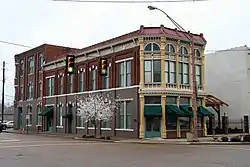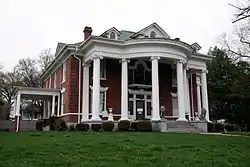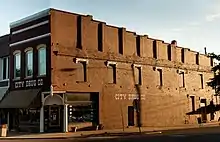Dyersburg, Tennessee
Dyersburg is a city and the county seat of Dyer County, Tennessee, in the United States. It is located in northwest Tennessee, 79 miles (127 km) northeast of Memphis on the Forked Deer River. The population was 17,145 at the 2010 census.[6]
Dyersburg, Tennessee | |
|---|---|
| City of Dyersburg | |
 The old Bank of Dyersburg | |
 Seal | |
| Nickname(s): D-burg | |
| Motto(s): "Dyersburg...the Gateway to Everywhere"[1] | |
 Location of Dyersburg in Dyer County, Tennessee. | |
| Coordinates: 36°2′N 89°23′W | |
| Country | United States |
| State | Tennessee |
| County | Dyer |
| Government | |
| • Mayor | John Holden |
| Area | |
| • Total | 17.43 sq mi (45.15 km2) |
| • Land | 17.32 sq mi (44.86 km2) |
| • Water | 0.11 sq mi (0.29 km2) |
| Elevation | 292 ft (89 m) |
| Population (2010) | |
| • Total | 17,145 |
| • Estimate (2019)[3] | 16,314 |
| • Density | 941.97/sq mi (363.69/km2) |
| Time zone | UTC-6 (CST) |
| • Summer (DST) | UTC-5 (CDT) |
| ZIP codes | 38024-38025 |
| Area code(s) | 731 |
| FIPS code | 47-22200[4] |
| GNIS feature ID | 1283267[5] |
| Website | www |
History
Early history
The lands that make up Dyersburg once belonged to the Chickasaw people. The final treaty by which they relinquished all of West Tennessee was signed in 1818.[7]
19th century
The first European settlers began to arrive in the area around 1819.[7] In 1823,[8] the Tennessee General Assembly passed an act to establish two new counties immediately west of the Tennessee River, Dyer County being one of them. John McIver and Joel H. Dyer donated 60 acres (240,000 m2) for the new county seat, named Dyersburg, at a central location within the county known as "McIver's Bluff". In 1825,[8] Dyer surveyed the town site into 86 lots. The first courthouse was built on the square in 1827. The current Classical Revival-style courthouse, designed by Asa Biggs in 1911, centers a downtown historic district listed in the National Register of Historic Places.
Situated as the hub of steamboat navigation on the Forked Deer River, Dyersburg grew as a river town, especially once the Grey Eagle made the first successful steamboat trip in 1836. The county's first industrial boom dates to 1879, when the steamboat Alf Stevens shipped timber from A. M. Stevens Lumber Company of Dyersburg to St. Louis, Missouri markets. The Stevens company established a large sawmill in 1880 and opened a planing mill in 1885. The Bank of Dyersburg opened in 1880, while another timber industry, Nichols & Co. Wooden Bowl Factory, began operations in 1881.[8]
The arrival of the Newport News and Mississippi Valley Railroad in 1884 further expanded market possibilities; a branch line, the Dyersburg Northern, soon linked the county seat to Tiptonville. The new railroad links encouraged the creation of new industries and businesses. In 1884, for example, investors established the Dyersburg Oil Company, a cottonseed factory. This company remained locally important through the 20th century.[8]
Civil War
During the Civil War, a number of skirmishes occurred in the Dyersburg area resulting in Union victories. On August 7, 1862, about 50 men of the 6th Illinois Cavalry Regiment attacked a group of Confederates about 5 miles east of Dyersburg.[9] In a report by Brigadier General Grenville M. Dodge, he wrote the Confederates who escaped left without their clothes, arms, or horses and said that "they killed some 25 to 30 [Confederates], took 53 horses, and a large number of guns & arms." Dodge also recommended burning the county as "They pay no attention to the oath, feed and guide the rebels." He reported they were assisted in routing the Confederates by "two Negros" and that "No white man had the pluck to do it."[9] On August 18, 1862, the 6th Illinois Cavalry Regiment attacked a small band of Confederates on the Obion River six miles from Dyersburg taking all their horses, arms, and ammunition.[10]
On January 30, 1863, the Skirmish at Dyersburg was fought. Confederate soldiers from Dawson’s Guerrilla Band spent the day skirmishing near the Forked Deer River bridge in Downtown Dyersburg with men from the Third Michigan Cavalry. Near midnight, Union forces under the command of Colonel Oliver Wood of the 22nd Ohio Infantry Regiment located the rebel stronghold in a house near the bridge and "completely routed them [Confederates], killing 2, wounding 4, and capturing 17, when the rebels broke and fled in every direction."[11] Nathan Bedford Forrest and Robert V. Richardson occupied Dyersburg in August 1863, until they retreated upon the arrival of Colonel Edward Hatch in the area.[12]
20th century
Between 1909 and 1914, Dyersburg emerged as a regional railroad hub as it became the junction point for three different lines, led by the Illinois Central Railroad.[8]

On December 2, 1917, a 24-year-old black farmhand named Lation (or Ligon) Scott[13] was brutally lynched by a white mob[14] before a crowd of thousands.[15] Over the course of several hours, Scott was publicly tortured. He was chained to a post in an empty lot adjacent to the town's court square.[16] Torturers burned out his eyes with red-hot irons.[15] When he cried out in pain, a red-hot poker was rammed down his esophagus.[15] He was then castrated, and more hot irons placed on his feet, back, and body until "a hideous stench of burning flesh filled the Sabbath air".[15] After being tortured, Scott was slowly burned at the stake.[14][15] Scott's torture and murder occurred over a three and a half hour period.[15] No one was prosecuted for the lynching.[13] Author Margaret Vandiver wrote in "Lethal Punishment: Lynchings and Legal Executions in the South", “The lynching of Lation Scott was the most ghastly of all those I researched.”[13]
In 1942, Dyersburg Army Air Base was established by the War Department to facilitate and support military bomber training. Following the end of World War II, the base was decommissioned in 1946.[17] A museum is currently located at the site of the former air base.[18]
On March 5, 1963, a Piper Comanche plane carrying country singers Patsy Cline, Hawkshaw Hawkins, Cowboy Copas, and Cline's manager/pilot Randy Hughes stopped to refuel in Dyersburg. The plane crashed around 20 minutes later in inclement weather near Camden, Tennessee.[19]
21st century
On September 17, 2003, Harold Kilpatrick Jr. took 15 people hostage in a classroom at Dyersburg State Community College. Kilpatrick was killed following a nine-hour standoff with police.[20]

Geography
Dyersburg is located in central Dyer County at 36°2′22″N 89°22′58″W (36.039440, -89.382766).[21] According to the United States Census Bureau, the city has a total area of 17.5 square miles (45.2 km2), of which 17.3 square miles (44.9 km2) is land and 0.1 square miles (0.3 km2), or 0.66%, is water.[6]
Dyersburg is located on the Forked Deer River and is 13 miles from the Mississippi River.
The city's proximity to the New Madrid Seismic Zone places it at risk for future earthquakes. USGS data shows an 18.28% chance of a major earthquake within 31 miles (50 km) of Dyersburg within the next 50 years. The largest earthquake within 30 miles (48 km) of Dyersburg was a 4.0-magnitude event in 2005.[22]
Demographics
| Historical population | |||
|---|---|---|---|
| Census | Pop. | %± | |
| 1870 | 683 | — | |
| 1880 | 1,010 | 47.9% | |
| 1890 | 2,009 | 98.9% | |
| 1900 | 3,647 | 81.5% | |
| 1910 | 4,149 | 13.8% | |
| 1920 | 6,444 | 55.3% | |
| 1930 | 8,733 | 35.5% | |
| 1940 | 10,034 | 14.9% | |
| 1950 | 10,885 | 8.5% | |
| 1960 | 12,499 | 14.8% | |
| 1970 | 14,523 | 16.2% | |
| 1980 | 15,856 | 9.2% | |
| 1990 | 16,317 | 2.9% | |
| 2000 | 17,452 | 7.0% | |
| 2010 | 17,145 | −1.8% | |
| 2019 (est.) | 16,314 | [3] | −4.8% |
| Sources:[4][23] | |||
Dyersburg's population was estimated at 17,002 in 2013. As of the census[4] of 2000, there were 17,452 people, 7,036 households, and 4,517 families residing in the city. The population density was 1,158.7 people per square mile (447.4/km2). There were 7,885 housing units at an average density of 523.5 per square mile (202.2/km2). The racial makeup of the city was 75.68% White, 22.02% African American, 0.21% Native American, 0.54% Asian, 0.02% Pacific Islander, 0.53% from other races, and 0.99% from two or more races. Hispanic or Latino of any race were 1.36% of the population.
There were 7,036 households, out of which 31.5% had children under the age of 18 living with them, 42.4% were married couples living together, 17.9% had a female householder with no husband present, and 35.8% were non-families. 30.9% of all households were made up of individuals, and 13.1% had someone living alone who was 65 years of age or older. The average household size was 2.39 and the average family size was 2.99.
In the city, the population was spread out, with 26.3% under the age of 18, 9.6% from 18 to 24, 27.6% from 25 to 44, 21.4% from 45 to 64, and 15.0% who were 65 years of age or older. The median age was 36 years. For every 100 females, there were 86.5 males. For every 100 females age 18 and over, there were 82.3 males. In 2013 there were 7,989 males and 9,013 Females. The median age: 37.6.
The median income for a household in the city was $28,232, and the median income for a family was $34,754. Males had a median income of $30,898 versus $21,337 for females. The per capita income for the city was $16,388. About 17.4% of families and 20.5% of the population were below the poverty line, including 29.5% of those under age 18 and 19.0% of those age 65 or over.
Education
- Dyersburg State Community College - established 1969.[24]
Media
- No known TV stations.
Newspaper
The Dyersburg State Gazette is a semi-weekly broadsheet newspaper published in Dyersburg.[25] The newspaper has a circulation of 7,900,[26] and is owned by Rust Communications.[26]
Notable people
- John Calvin Fiser (1838-1876) was an American merchant and soldier (Colonel)[27]
- Robert Fuller (1947–present), professional wrestler, better known as a manager in WCW and WWF
- James A. Gardner (First Lieutenant), recipient of the Medal of Honor, 1966
- George "Two Ton" Harris (1927-2002) (wrestler), known as "Baby Blimp", professional wrestler, National Wrestling Alliance
- Emmett Kelly, Jr. (1923-2006), "The World's Most Famous Clown" better known as "Weary Willie"[28]
- Michael Swift (1974–present) (National Football League) 1997 San Diego Chargers, 1998-1999 Carolina Panthers, 2000 Jacksonville Jaguars
- Henderson Edward Wright (1919-1995), Major League Baseball pitcher, Boston Braves and Philadelphia Athletics - 1945–48, 1952
Parks and recreation
Dyersburg has several public parks, recreational centers, and swimming pools.[29] Reelfoot Lake State Park is located 28 miles (45 km) to the north in Lake and Obion counties.
Sports
From 1923 to 1925, Dyersburg was home to a Minor League Baseball team known as the Dyersburg Forked Deers (1923–1924) and Dyersburg Deers (1925).[30] They won the Kentucky–Illinois–Tennessee League championship in 1923 and 1924.[31][32]
Transportation
- Dyersburg Regional Airport, KDYR, DYR by the FAA - 275 Acres
- Newbern–Dyersburg station, Amtrak station
Hospital
West Tennessee Healthcare Dyersburg Hospital is a Joint Commission accredited[33] hospital. The medical center has 225 beds.[34] Originally built as Parkview Hospital in 1956,[35] the hospital has changed stewardship multiple times since its inception.[36][37]
Cultural references
- Dyersburg was mentioned in the lyrics of the song "Tennessee" by the 1990s hip hop group Arrested Development.
- Dyersburg was featured on a fake ID during the Mother Simpson episode of The Simpsons.[38]
References
- "City of Dyersburg, Tennessee". City of Dyersburg, Tennessee. Archived from the original on 2012-07-04. Retrieved August 14, 2012.
- "2019 U.S. Gazetteer Files". United States Census Bureau. Retrieved July 30, 2020.
- "Population and Housing Unit Estimates". United States Census Bureau. May 24, 2020. Retrieved May 27, 2020.
- "U.S. Census website". United States Census Bureau. Retrieved 2008-01-31.
- "US Board on Geographic Names". United States Geological Survey. 2007-10-25. Archived from the original on 2012-02-26. Retrieved 2008-01-31.
- "Geographic Identifiers: 2010 Demographic Profile Data (G001): Dyersburg city, Tennessee". American Factfinder. U.S. Census Bureau. Archived from the original on February 13, 2020. Retrieved January 7, 2016.
- Willoughby Jr., Earl (November 6, 2002). "The genesis of Dyer County". Dyersburg State Gazette. Retrieved September 28, 2019.
- Van West, Carroll. "Dyer County". Retrieved September 28, 2019.
- The War of the Rebellion: a compilation of the official records of the Union and Confederate armies. 24. Washington, D.C.: Government Printing Office. 1880–1901. pp. 29–30.
- The War of the Rebellion: a compilation of the official records of the Union and Confederate armies. 24. Washington, D.C.: Government Printing Office. 1880–1901. pp. 33–34.
- The War of the Rebellion: a compilation of the official records of the Union and Confederate armies. 35. Washington, D.C.: Government Printing Office. 1880–1901. p. 335.
- The War of the Rebellion: a compilation of the official records of the Union and Confederate armies. 109. Washington, D.C.: Government Printing Office. 1880–1901. pp. 431–432.
- "1917: Lation Scott lynched". executedtoday.com. 2 December 2014. Archived from the original on 2018-05-13. Retrieved 17 April 2018.
- Hiaasen, Carl (February 21, 2015). "Racial lynchings, our own history of terrorism". Miami Herald. Archived from the original on 2015-02-22. Retrieved September 28, 2019.
- Burghardt Du Bois, William Edward (1918). The Crisis, Volume 15, No. 4. 70 Fifth Avenue, New York, NY: Crisis Publishing Company. pp. 178, 179, 180, 181, 182, 183.CS1 maint: location (link)
- "Who was Lation (Ligon) Scott? – Dyersburg, TN". Black Ripley. 2013-11-02. Retrieved 2019-09-28.
- "WWII Dyersburg Army Air Base – Halls TN, 1942". Tennessee History. 2017-08-22. Retrieved 2019-09-28.
- "Dyersburg Army Air Base Memorial Association". website. Retrieved 2019-09-28.
- Larry Jordan (5 March 2013). "What really happened in the Patsy Cline plane crash". boardhost.com. Retrieved 29 November 2015.
- "Dyersburg Hostage Situation Ends in Death, Bloodshed". KAIT. Retrieved 2019-09-28.
- "US Gazetteer files: 2010, 2000, and 1990". United States Census Bureau. 2011-02-12. Retrieved 2011-04-23.
- "M 4.0 - 12km S of Ridgely, Tennessee". USGS Earthquake Hazards Program. Retrieved 2019-09-28.
- "{title}". Archived from the original on 2013-11-06. Retrieved 2013-12-11.
- "About the College". www.dscc.edu. Retrieved 2019-09-28.
- "Dyersburg State Gazette". Dyersburg State Gazette. Archived from the original on 2012-08-14. Retrieved August 14, 2012.
- "Dyersburg News State Gazette". YP Intellectual Property LLC. Retrieved August 14, 2012.
- Sources vary as to the exact date of his death. Banks (p. 87) gives June 4; both "Antietam on the Web" and Allardice (p. 87) state June 14; Eicher (p. 596) gives June 15.
- "Emmett Kelly Jr". www.emmettkellyjr.com. Retrieved 2019-09-29.
- "Dyersburg, TN". dyersburgtn.gov. Retrieved 2019-09-28.
- "1923 Dyersburg Forked Deers Roster". Stats Crew. Retrieved May 25, 2020.
- "Dyersburg Crowned League Champion After Winning Series from Mayfield". News-Democrat. Paducah. September 12, 1923. p. 6 – via Newspapers.com.
- "Deers Win Title of Kitty Loop from Paris". The Courier-Journal. Louisville. September 17, 1924. p. 9 – via Newspapers.com.
- "Dyersburg Hospital awarded accreditation from joint commission". Dyersburg State Gazette. June 25, 2019. Retrieved September 28, 2019.
- "Dyersburg Hospital". West Tennessee Healthcare. Retrieved 2019-09-28.
- "Methodist Healthcare-Dyersburg Hospital on Parkview Street in Dyersburg". Dyersburg State Gazette. September 25, 2002. Retrieved September 28, 2019.
- "Dyersburg Regional joins Tennova Healthcare". Dyersburg State Gazette. September 15, 2015. Retrieved September 28, 2019.
- "Dyersburg hospital sold to West Tennessee Healthcare". Dyersburg State Gazette. March 27, 2018. Retrieved September 28, 2019.
- "In The Frame - Mona's Fake ID's This episode aired..." Wide and Tall Simpsons Caps. Retrieved 2019-09-28.